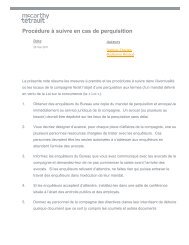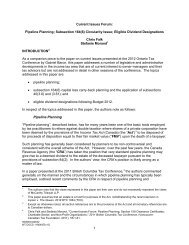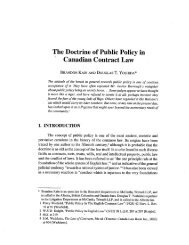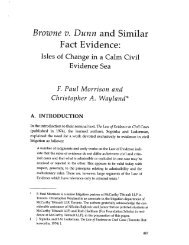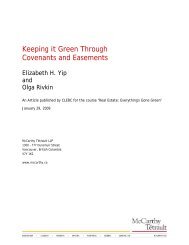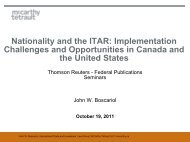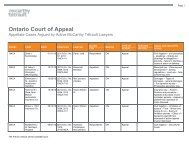1. COMPETITION - McCarthy Tétrault
1. COMPETITION - McCarthy Tétrault
1. COMPETITION - McCarthy Tétrault
You also want an ePaper? Increase the reach of your titles
YUMPU automatically turns print PDFs into web optimized ePapers that Google loves.
service tax. However, services such as pay roll processing, account<br />
management, etc., rendered even through the use of computer programs,<br />
cannot be termed as activities that primarily relate to computer systems,<br />
since the use of a computer in these services is secondary while the<br />
primary activity is that of business-related work. Accordingly, such services<br />
will attract a service tax of 8%. The mere fact that a computer or a laptop<br />
has been used for providing the service does not, ipso facto, make the<br />
service an IT service. IT service essentially means any service related to<br />
designing, developing, or maintaining computer software, or computerized<br />
data processing, system networking, or any other service primarily related<br />
to the operation of computer systems.<br />
For more information please contact: vaibhav@nishithdesai.com<br />
INDIA<br />
SERVER HELD TO CONSTITUTE<br />
PERMANENT ESTABLISHMENT<br />
A recent resolution between the U.S. competent authority and its Indian<br />
counterpart as regards VISA's obligation to pay taxes in India does not<br />
provide good news to this credit card major. VISA will now be required to<br />
shell-out the taxes demanded by the Indian revenue authorities, as the<br />
U.S. competent authority has concurred with the views of the Indian<br />
revenue authorities that VISA is liable to tax in India.<br />
The Indian revenue authorities had held that the revenues attributed to<br />
VISA operations carried out in India were taxable in India because VISA<br />
had a fixed place of business in India. The revenue authorities reckoned<br />
that the server through which business was transacted constituted a<br />
Permanent Establishment (the "PE") of VISA in India.<br />
Under Article 5 of the Indo-U.S. Double Taxation Avoidance Agreement<br />
(the "Treaty"), a PE means a fixed place of business through which an<br />
enterprise operates either wholly or partly, and includes a place of<br />
management, a branch, an office, a factory, a workshop, etc. Furthermore,<br />
as per Article 7 of the Treaty, the business profits of a U.S. company can<br />
be taxed in India only if it has a PE in India and such profits can be taxed<br />
only to the extent that these are attributable to the PE in India.<br />
The Indian revenue authorities had sought to tax VISA for that portion of its<br />
profits that could be attributed to its Indian operations by concluding that<br />
the server located in India constituted a PE of the company in India. VISA<br />
had contested the income tax demands raised on it and had approached<br />
the competent authority of the U.S. as per the Mutual Agreement<br />
Procedure (the "MAP") prescribed under the Treaty.<br />
The U.S. competent authorities have now settled the issue in favor of the<br />
Indian revenue authorities by holding that that VISA has a PE in India. The<br />
U.S. authorities have sought a reassessment of income tax demand raised<br />
on VISA, based on acceptance of the fact that the company has a PE in<br />
India.<br />
MAP proceedings are confidential in nature and, therefore, the details of<br />
the same are not published for public reference.<br />
For more information please contact: vaibhav@nishithdesai.com<br />
INDIA<br />
SERVICE TAX TO BPO COMPANIES<br />
The 2003-2004 budget has increased the service tax rate from 5% to 8%,<br />
and has brought ten new services within the tax net.<br />
Among the new taxable services is one "provided by a commercial concern<br />
in relation to business auxiliary service."<br />
The phrase "business auxiliary service" has been defined as any service in<br />
relating to:<br />
• "promotion or marketing or sale of goods produced or provided by or<br />
belonging to the client; or<br />
• promotion or marketing of service provided by the client; or<br />
• any customer care service provided on behalf of the client; or<br />
• any incidental or auxiliary support service such as billing, collection or<br />
recovery of cheques, accounts and remittance, evaluation of<br />
prospective customer or public relation services, and includes services<br />
as commission agent, but does not include any information technology<br />
service."<br />
Thus, the definition for "business auxiliary service" encompasses a wide<br />
range of activity. Services like client query processing, billing, accounting,<br />
payroll, telemarketing, etc. are now in the ambit of service tax.<br />
Furthermore, Notification 2/2003, dated 1st March 2003, has withdrawn an<br />
earlier notification that exempted from service tax activity involving<br />
payments received in foreign exchange. The combined effect would mean<br />
that most of the services that are typically rendered by BPO companies<br />
and call centers to their foreign or Indian clients could attract a service tax<br />
of 8%.<br />
Services rendered by BPO companies will not be subject to service tax if<br />
the services can be classified as "information technology services." An<br />
explanation provides: "For the removal of doubts, it is hereby declared that<br />
for the purposes of this clause 'information technology service' means any<br />
service in relation to designing, developing or maintaining of computer<br />
software, or computerized data processing or system networking, or any<br />
other service primarily in relation to operation of computer systems."<br />
Analysis of the above explanation reveals that the phrase "information<br />
technology service" has been defined in a very restrictive manner, and thus<br />
would cover only those services that relate to the design, development,<br />
maintenance, and operation of computer software/computer systems and<br />
system networking. Most of the above-mentioned categories do not apply<br />
to services provided by BPO companies; computerized data processing is<br />
the only exception that could be pertinent to BPO operation. However,<br />
several services of a BPO company, like medical transcript, billing, etc.,<br />
may not fall within the category of computerized data processing and<br />
hence the service tax may be applicable.<br />
The Budget's explanatory memorandum, however, seems to indicate<br />
otherwise. The relevant portion of the memorandum reads: "Business<br />
promotion and support services including customer care services. These<br />
services include launching of products, customer education programmes,<br />
conduct of seminars, help desk services, managing front offices, enquiry<br />
bureaus, etc. however computer enabled services, namely, data<br />
processing, networking, back office processing, computer facility<br />
management shall not be subjected to service tax."<br />
The language of the explanatory memorandum suggests that government's<br />
intention was to exclude computer enabled data processing, as well as<br />
computer enabled back office processing services, from the service tax.<br />
However, the definition of "business auxiliary services" covers most of the<br />
back office processing services as taxable services except the services<br />
that are computerized data processing services. The phrase "computerized<br />
data processing" is more restrictive than the phrase "computer enabled<br />
data processing." Furthermore, computer enabled back office processing is<br />
absent from the section altogether. This leads one to deduce that the<br />
action does not match the intention.<br />
In conclusion, keeping in mind the tremendous growth potential of this<br />
industry and the desire of Indian government and industry to be hub of<br />
back office services, it is necessary for the Government to clarify whether<br />
ISSUE 22 SEPTEMBER – OCTOBER 2003 12



